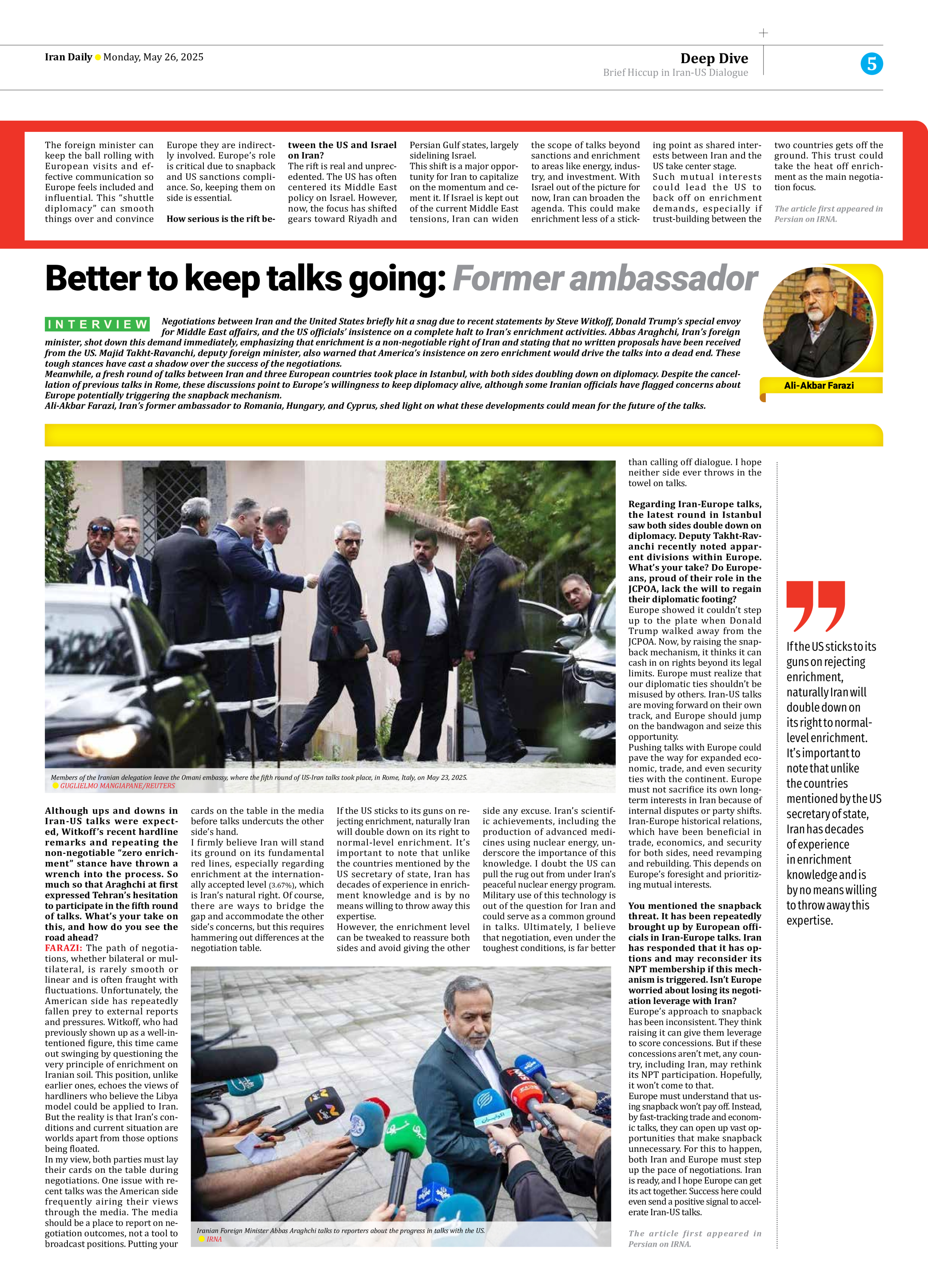
Better to keep talks going: Former ambassador
Negotiations between Iran and the United States briefly hit a snag due to recent statements by Steve Witkoff, Donald Trump’s special envoy for Middle East affairs, and the US officials’ insistence on a complete halt to Iran’s enrichment activities. Abbas Araghchi, Iran’s foreign minister, shot down this demand immediately, emphasizing that enrichment is a non-negotiable right of Iran and stating that no written proposals have been received from the US. Majid Takht-Ravanchi, deputy foreign minister, also warned that America’s insistence on zero enrichment would drive the talks into a dead end. These tough stances have cast a shadow over the success of the negotiations. Meanwhile, a fresh round of talks between Iran and three European countries took place in Istanbul, with both sides doubling down on diplomacy. Despite the cancellation of previous talks in Rome, these discussions point to Europe’s willingness to keep diplomacy alive, although some Iranian officials have flagged concerns about Europe potentially triggering the snapback mechanism. Ali-Akbar Farazi, Iran’s former ambassador to Romania, Hungary, and Cyprus, shed light on what these developments could mean for the future of the talks.
Although ups and downs in Iran-US talks were expected, Witkoff’s recent hardline remarks and repeating the non-negotiable “zero enrichment” stance have thrown a wrench into the process. So much so that Araghchi at first expressed Tehran’s hesitation to participate in the fifth round of talks. What’s your take on this, and how do you see the road ahead?
FARAZI: The path of negotiations, whether bilateral or multilateral, is rarely smooth or linear and is often fraught with fluctuations. Unfortunately, the American side has repeatedly fallen prey to external reports and pressures. Witkoff, who had previously shown up as a well-intentioned figure, this time came out swinging by questioning the very principle of enrichment on Iranian soil. This position, unlike earlier ones, echoes the views of hardliners who believe the Libya model could be applied to Iran. But the reality is that Iran’s conditions and current situation are worlds apart from those options being floated.
In my view, both parties must lay their cards on the table during negotiations. One issue with recent talks was the American side frequently airing their views through the media. The media should be a place to report on negotiation outcomes, not a tool to broadcast positions. Putting your cards on the table in the media before talks undercuts the other side’s hand.
I firmly believe Iran will stand its ground on its fundamental red lines, especially regarding enrichment at the internationally accepted level (3.67%), which is Iran’s natural right. Of course, there are ways to bridge the gap and accommodate the other side’s concerns, but this requires hammering out differences at the negotiation table.
If the US sticks to its guns on rejecting enrichment, naturally Iran will double down on its right to normal-level enrichment. It’s important to note that unlike the countries mentioned by the US secretary of state, Iran has decades of experience in enrichment knowledge and is by no means willing to throw away this expertise.
However, the enrichment level can be tweaked to reassure both sides and avoid giving the other side any excuse. Iran’s scientific achievements, including the production of advanced medicines using nuclear energy, underscore the importance of this knowledge. I doubt the US can pull the rug out from under Iran’s peaceful nuclear energy program. Military use of this technology is out of the question for Iran and could serve as a common ground in talks. Ultimately, I believe that negotiation, even under the toughest conditions, is far better than calling off dialogue. I hope neither side ever throws in the towel on talks.
Regarding Iran-Europe talks, the latest round in Istanbul saw both sides double down on diplomacy. Deputy Takht-Ravanchi recently noted apparent divisions within Europe. What’s your take? Do Europeans, proud of their role in the JCPOA, lack the will to regain their diplomatic footing?
Europe showed it couldn’t step up to the plate when Donald Trump walked away from the JCPOA. Now, by raising the snapback mechanism, it thinks it can cash in on rights beyond its legal limits. Europe must realize that our diplomatic ties shouldn’t be misused by others. Iran-US talks are moving forward on their own track, and Europe should jump on the bandwagon and seize this opportunity.
Pushing talks with Europe could pave the way for expanded economic, trade, and even security ties with the continent. Europe must not sacrifice its own long-term interests in Iran because of internal disputes or party shifts. Iran-Europe historical relations, which have been beneficial in trade, economics, and security for both sides, need revamping and rebuilding. This depends on Europe’s foresight and prioritizing mutual interests.
You mentioned the snapback threat. It has been repeatedly brought up by European officials in Iran-Europe talks. Iran has responded that it has options and may reconsider its NPT membership if this mechanism is triggered. Isn’t Europe worried about losing its negotiation leverage with Iran?
Europe’s approach to snapback has been inconsistent. They think raising it can give them leverage to score concessions. But if these concessions aren’t met, any country, including Iran, may rethink its NPT participation. Hopefully, it won’t come to that.
Europe must understand that using snapback won’t pay off. Instead, by fast-tracking trade and economic talks, they can open up vast opportunities that make snapback unnecessary. For this to happen, both Iran and Europe must step up the pace of negotiations. Iran is ready, and I hope Europe can get its act together. Success here could even send a positive signal to accelerate Iran-US talks.
The article first appeared in
Persian on IRNA.







